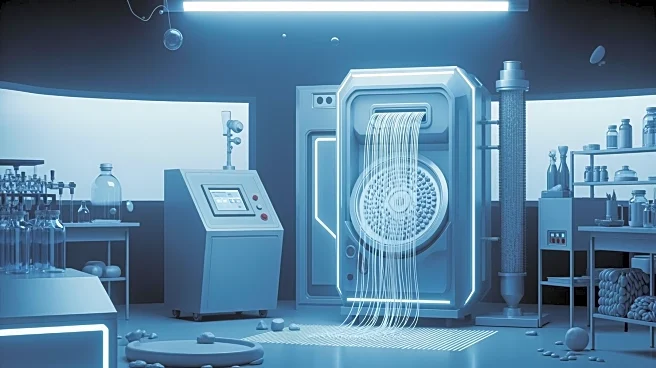What's Happening?
Researchers at the Massachusetts Institute of Technology have developed biodegradable polymers designed to replace small plastic particles in personal care products. These polymers can break down into harmless substances like sugars and amino acids, reducing
the environmental impact of microplastics. The study, published in Nature Chemical Engineering, highlights the potential for these materials to address the issue of microplastic pollution. Additionally, a team at the University of Washington has created spirulina-based bioplastics that can compost in backyard bins, offering a practical solution for home composting. The focus is on using biodegradable materials for short-life items such as kitchen wipes and packaging, which are major contributors to waste.
Why It's Important?
The development of biodegradable polymers is significant in the fight against microplastic pollution, which poses a threat to marine life and ecosystems. By replacing traditional plastics with biodegradable alternatives, industries can reduce their environmental footprint and contribute to sustainability efforts. This innovation could lead to widespread changes in manufacturing practices, encouraging companies to adopt eco-friendly materials. Consumers stand to benefit from clearer labeling and more sustainable product choices, potentially influencing purchasing decisions and driving demand for green products.
What's Next?
As biodegradable polymers gain traction, industries may begin to integrate these materials into their products, leading to a shift in manufacturing standards. Researchers will likely continue to explore new biodegradable materials and improve existing ones to enhance their effectiveness and applicability. Policymakers might consider regulations to promote the use of biodegradable materials, potentially incentivizing companies to adopt sustainable practices. Public awareness campaigns could educate consumers on the benefits of biodegradable products, encouraging more environmentally conscious purchasing decisions.
Beyond the Headlines
The push for biodegradable materials raises ethical considerations regarding consumer responsibility and corporate accountability in environmental conservation. It also highlights the need for infrastructure to support industrial composting, which is essential for the effective breakdown of many biodegradable products. Long-term, this development could influence cultural attitudes towards waste and sustainability, fostering a more environmentally aware society.















